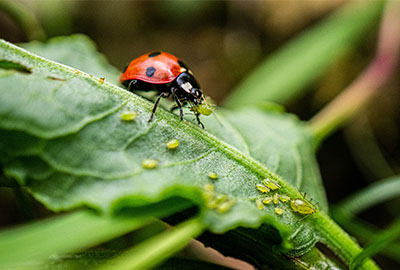Principle 8: Manage Yard Pests Responsibly
It is unrealistic and even unwise to strive for a yard completely free of insects, diseases, and weeds. Many insects are harmless and provide beneficial services, such as feeding on other insects, which cause plant damage. Integrated Pest Management (IPM) is an effective and environmentally sensitive approach to pest management that involves: prevention, monitoring, pest identification, treatment selection, and proper application. By following these steps, you can successfully manage pests while protecting beneficial insects. Let nature do the work and help reduce the use of pesticides.

Action Checklist:
Learn to identify five beneficial insects that provide natural control of harmful pests.
Wherever possible use non-chemical approaches for pest control; cultural controls, such as pruning out damaged or affected areas, hand-removing insects, and clearing away infected or diseased debris are all ways to reduce pest populations naturally.
Use lower toxicity pesticides such as horticultural oils, insecticidal soaps and biological controls. These effective, safe materials can control most plant pests.
Avoid routine applications of pesticides. Treat only affected areas rather than spraying your entire lawn or yard. When using pesticides, the label is the law. Require that your yard maintenance company, if used, follow these strategies.

